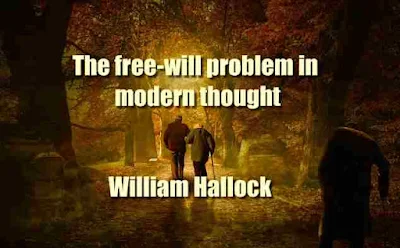The free-will problem in modern thought
It is now some twenty years since Professor James opened his famous address on the " Dilemma of Determinism " with the remark that he knew of no subject which was less worn out than the free-will controversy. Subsequent events have justified his opinion, and various circumstances, among which the influence of Professor James' polemic is not unimportant, have conspired to bring forward again this world-old problem, and make it at the beginning of our century one of the prime subjects of philosophic discussion.
Authoritative announcements that the free-will doctrine has been "shattered" by modern science or that the problem has been " dropped " by modern philosophy have not been wanting, but in the light of the recent discussion, these seem, to say the least, premature.
The writings of Martineau, Bradey, Ward and Royce, not to mention Howison, Mallock and the authors of " Personal Idealism," give evidence of a deep and widespread philosophical interest, and this interest may, perhaps, excuse the present attempt to show how the problem presents itself to the modern scientific and ethical consciousness.
If we go back to Greek philosophy, we find that the free-will question emerged as a problem in ethics. Plato and Aristotle give us no detailed nor comprehensive treatment, and perhaps no unambiguous answer.
Certain passages in both writers, however, undoubtedly favour the libertarian position, and here, as has been remarked of Plato, "a psychological decision " is reached " on essentially ethical grounds." ' In the later moral systems, Stoic and Epicurean, the discussion of the problem became more prominent, and its metaphysical bearings were clearly brought out.
The Stoic, though emphasizing the dignity of human nature and the power of man to rise superior to the accidents of fortune, decided against free-will in the interests of a monistic doctrine of fate or providence; the Epicurean, on the other hand, holding that free-will was necessary to the attainment of the highest happiness, sought a metaphysical ground for it in an assumed " declination " in the primaeval atoms.
The problem became more acute in the form in which it was raised by Christian theology, which deepened at the same time the sense of guilt and responsibility, and of dependence upon divine grace for all spiritual good.
The relation of free-will to the divine attributes of omniscience and omnipotence, to the origin of moral evil and to the administration of divine grace, furnished the subjects of the great theological debate carried on successively between Augustinian and Pelagian, between Thomist and Scotist, and between Calvinist and Arminian,
The roots of modern discussion are to be found in the psychological and psychophysical theories of Descartes, Spinoza and Leibnitz. Its course has been influenced also by Hume's treatment of causation, and most of all by Kant's doctrine of man as a citizen of two worlds, in one of which he is phenomenally determined, and in the other noumenally free.
While the free-will question is primarily a psychological one, having to do with the analysis of volition and its relation to the other elements of consciousness, it has come to have important connections with physical science, as well as with * Windelband: History of Philosophy ethics, metaphysics and theology. It may be said that the psychophysical aspect of the question is just now most prominent, and, of course, there can be no adequate treatment of this aspect without taking into account the physiology of the brain and nervous system, the physical law of the conservation of energy, and the biological doctrine of evolution.
Underlying the scientific form of the discussion, and lending it zest and interest, are always the deeper ethical and spiritual issues supposed to be involved. In general, it may be said that the discussion takes now a wider range than ever before, while its storm-centre for the present is the relation between mind and brain. We shall find it convenient to take up first those phases of the subject most closely related to physical science, and shall then consider its relation to modern psychology, ethics and theology.
The relation between mind and body is a question now well to the fore in philosophical discussion. There are three generic theories now current, automatism, parallelism and interactionism, and these have historic roots in the speculations of Descartes and his successors.
Download 3 MB


